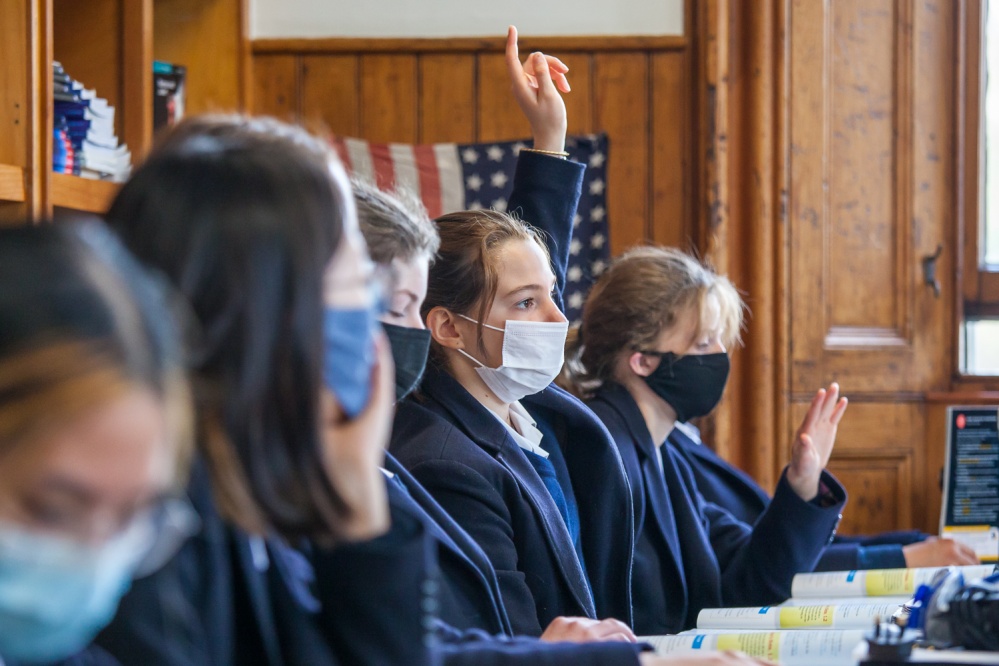What to expect from our schools’ exams in 2022

We speak to the the North East and Yorkshire’s leading schools and colleges to tackle the confusion surrounding next year’s exams

Sarah Grice, assistant head (academic) at Scarborough College, explains: ‘In March 2020, as the pandemic struck, examinations were cancelled with only two months to go. Schools were asked to submit teacher calculated grades for examination cohorts and Ofqual, the UK exam regulator, devised a grade standardisation algorithm to combat grade inflation. So controversial did the algorithm prove to be after A Level results day in 2020, that the government and Ofqual U-turned prior to GCSE results and all students received the grades determined by their teachers.’
January 2021, exams were scheduled to go ahead as normal, with some reduced content in certain subjects. But when a third lockdown was announced, teachers and their students were told that exams would be replaced by teacher assessed grades (or TAGs).
‘At Scarborough College, the priority through all of this has been to “keep calm and carry on”,’ Sarah explains. ‘When all around there is uncertainty, procrastination and lack of strategic planning, it has been the role of teachers to keep students informed, motivated and challenged. In 2020, with examinations cancelled with weeks to go and teachers dealing with the first round of online teaching, Scarborough College launched an online pre-Sixth course to fill the void for students who should have been sitting the most important examinations of their lives thus far. Rather than having months with nothing to do, young people had the chance to look ahead through new content and online engagement with their peers.’
This year, Sarah admits that the challenge they faced was even greater than that of 2020. ‘How do you motivate 16 year olds whose external examinations have been cancelled with six months to go?,’ she asks. ‘The answer has to be: intrinsically. Despite the removal of the “final hurdle”, the students still wanted to learn, still wanted to prove themselves, and kept going to the end. Teachers invested a huge amount of time and energy into determining TAGs, ensuring that each student was given every opportunity to demonstrate what they could do.
Alastair Armstrong, director of teaching and learning at Fettes College in Edinburgh, explains the challenges of this exam period when he says ‘clearly last summer was a difficult time for pupils and teachers alike in terms of the way in which grades were awarded at GCSE and A Level’. At Fettes College, staff wanted to give every pupil an opportunity to demonstrate their level of performance in each of their subjects, and providing both academic and pastoral support was important throughout. ‘From our perspective we were confident that the quality of our online provision during lockdown would allow pupils to return in the summer with a strong base of knowledge and the requisite skills to cope with the assessments,’ Alastair continues. ‘Whilst assessments had to take place, we were mindful of the stress and anxiety of our pupils and made sure, where possible, that these were undertaken in class, under controlled conditions, rather than in a full blown examstyle setting. It was crucial to communicate to the pupils and parents the parameters of the assessment, and to reassure them that the whole process was fair and equal for everyone.’
This was helped by each pupil at the college having a tutor in the boarding house who was able to guide and support them. ‘In the end we were hugely impressed by the maturity and determination shown by our pupils,’ Alastair reflects. ‘Whilst it would be easy to undermine the grades received on results day 2021, given there were no public examinations, these pupils arguably had to show even more grit and resilience than their predecessors to fulfil their potential.’
At Queen Ethelburga’s Collegiate, both staff and students embraced the blended learning approach of online and in-person teaching, ensuring that they continued to achieve at the highest possible standards. Making the best of an unusual situation, it seems they thrived in this new way of learning. ‘The system for allocating results has been exceptionally demanding for students and staff, with quality assurance by schools and examination boards being rigorous and comprehensive, over a period of many months,’ says Daniel Machin, acting principal. ‘However, our exceptional online provision gave us a comprehensive evidence base on which to assess our results. With this in mind, QE students have been delighted with their achievements, which reflect fully their dedication and work-ethic during the past two years.’
When it comes to preparations, students had plenty of support at QE when they needed it most. ‘The stability, advice, and support throughout their time with us helps us to build their independence, responsibility and resilience,’ adds Daniel. ‘Our THRIVE@QE initiative offers pastoral support to all students throughout the year, but attending sessions on the challenges presented by the pandemic has offered support at crucial times. As students return to the traditional approach to exams in 2022 with adaptions, and normal standards in 2023 as announced by the government, we will continue to support them in developing the independent learning skills they need to succeed. At QE we have high expectations of our students and will always encourage them to aspire to reach their goals.’

‘Our pupils adapted to this magnificently, with the same focus and hard work they have displayed throughout these unprecedented times, as they were subject to mock examinations, pieces of coursework and a plethora of other assessments, which fairly determined their grades,’ says Barnard Castle School’s communications manager Stuart Nicholls. The switch from face-to-face learning to virtual learning posed a challenge to pupils, but Stuart says this transition was seamless, as pupils embraced their Learning@Home provision. That included online lessons and all-important interactions with teachers throughout. ‘Pupils continued to work hard and focused on all internal examinations and coursework as if it were the “real thing”, and they should all be proud of their resilience throughout,’ Stuart adds.
On that positive note, we ask Stuart how pupils at Barnard Castle School are preparing for future exams – and what those future exams will entail. Thankfully, he reveals that they are expecting normal, external examinations to take place this year and therefore will be preparing accordingly in line with examination boards’ regulations. On how pupils should best prepare, he says they should ‘prepare as well as last year’s cohort did: as if every mock examination and coursework counted towards their final grade’. ‘Our pupils were exceptional in their preparedness and resilient throughout, as they – and our wider community – have been during these unprecedented times,’ he adds.
When we ask about the impact of TAGs on the students and staff at Newcastle School for Boys, Alex Kingsland, director of marketing and admissions, says it was very different to normal. ‘Schools were under pressure to be responsible for delivering course material as well as assessing and ultimately determining outcomes for their pupils. Pupils themselves had to be resilient and adaptable in the face of numerous in-house assessments being conducted to help inform the judgements, and on the back of an academic year which has already endured significant disruption,’ Alex continues. ‘Whilst we would all hope that next summer offers more stability and normality, pupils and schools need to be prepared for the use of internal assessment data again if the need arises. It has never been more important to ensure that pupil performance is as good as it can be right from the early weeks of the new academic year, and that any opportunity to be assessed is promoted and grasped.’
Staff and pupils are proud of the results in GCSEs and A Levels at Yarm School, which head Dr Huw Williams says are based on robust and fair assessments of their progress. ‘We held a number of assessments in each subject over the course of the summer term to ensure that each pupil was given the opportunity to demonstrate their ability and progress,’ he tells us. ‘Marking was carried out “blind” as well as being internally moderated to ensure fairness and remove unconscious bias.’
Huw also praises his staff for their hard work throughout these challenging times. ‘Our teachers worked tirelessly during this period to manage the additional pressures on their time and workload alongside the ongoing teaching and extracurricular activities available to pupils in other year groups,’ he says. ‘We continue to review and consider all guidance from the DfE, Ofqual and the Examination Boards to ensure that our pupils are supported and guided towards whatever form assessment takes this year, but we anticipate that qualifications will be awarded on the basis of examinations rather than on teacher assessments.’
But what will exams look like in 2022? The government have confirmed that GCSE, AS and A Level exams in England next summer will be adapted to focus on fairness and help students continue to thrive. On 30th September, following a public consultation, the government and Ofqual confirmed these changes such as a choice of topics in some GCSE exams, advance information to focus students’ revision and support materials for subjects such as maths. With fairness in mind, Ofqual has also set out its approach to grading. Next year will be a transition year with grade boundaries to be set by exam boards reflecting a midway point between 2021 and 2019. It’s hoped results will return to ‘normal’ by 2023 – but what we do know is that these students and their teachers and support staff will be able to adapt to any changes they may face. That’s certainly been proven.
While very unusual and admittedly disruptive, it seems students at these schools did thrive in unprecedented times – and their good grades prove just that. Although students showed resilience and the ability to adapt in these times, hope continues in the fact that students should face a more ‘normal’ exam period next time around.







